

The U.S. prison population has grown more than 700 percent between 1970 and 2009. We’re locking people up left and right, including thousands of non-violent immigrants whose only crime is crossing the border without documentation. They are now trapped in private prisons with no voice.
The American Civil Liberties Union (ACLU) has just released the jaw-dropping findings of its investigation into the shadowy system of privately run Criminal Alien Requirement (CAR) prisons used to hold immigrants. Here, thousands of immigrants serve lengthy prison sentences where they are exposed to abysmal conditions.
Private prisons have a lot to gain from the incarceration of immigrants. Their business model revolves around imprisoning people for profits, siphoning tax dollars away from public goods and into shareholders’ pockets. For locked-up immigrants, however, it means being isolated from family and the outside world.
Until ACLU’s blockbuster investigation, CAR facilities have operated in the shadows,


Why a major magazine put the issue of reparations for slavery on its June cover, I really don’t know. Maybe because Juneteenth – the festival marking the day in 1865 when Texas slaves learned of their emancipation 18 months after President Lincoln had signed it – comes in June. Of course, that date rolls around every June 19 and the concept of reparations existed long before emancipation.
Reparations came to my attention through civil rights activism in the 1960s, although it was proposed by abolitionists before the Civil War. Lincoln’s “40 Acres and a Mule” policy was actually a form of reparations, recognizing that the wealth of much of the country had come from the work of slaves who remained landless and penniless, and without many opportunities otherwise. Where it was implemented change happened, even in the Deep South. But it stalled after Lincoln’s assassination, and things went backwards as segregation took root and became the common public policy of the nation.


Pity the poor, beleaguered Malibu homeowner. Median income over $135,000 is about two-and-a-half times the County average, and the average home’s value is so far past the County average that the Census Department literally doesn’t count that high. Good for them. But they’re also the NIMBY champs, they don’t like sharing funding with poor schools, and in their free time, folks in the ‘Bu go around erecting illegal signs to cheat you and me out of our right to access the public beach. They have it rough and, as the front page of the L.A. Times explained, Airbnb is making it worse.
Malibu homeowners have some reasonable points: “party houses” that disturb neighbors and probably violate zoning ordinances, and millions of dollars of lost city revenue. At the same time, it’s hard to get too worked up over the poor,
» Read more about: The Enemy of My Enemy Is Still a Jackass »


Twice a year Sacramento goes into a frenzy analyzing the state budget. First, in January, the Governor releases his proposed budget, then the “May Revise” appears as the Governor adjusts projections and heeds advice from Senators and Assembly members. The budget, however, is more than a long economic document. It becomes part of the Governor’s legacy, it’s a statement of his priorities, how he will want to be remembered and what he believes will be best for Californians.
Governor Jerry Brown is shaping a legacy based on fiscal responsibility. He wants to be remembered as the Governor who solved the debt crisis and bequeathed fiscal stability to California. Unlike his predecessor, Governor Brown has invested in education, by creating a solvent K-12 system and reinvesting, albeit modestly, in public higher education. However, he is missing some crucial elements that will undermine this success: namely, an investment in low-income families. The Governor forgot that it is working families who most need fiscal solvency.
» Read more about: Working Families Need a Better May Revise »
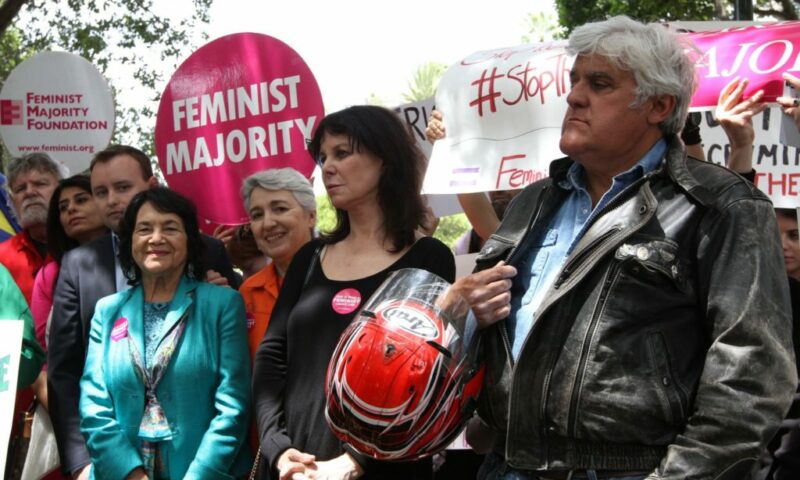

About 80 activists representing feminists, gays and lesbians, workers and Hollywood celebrities rallied in front of the iconic Beverly Hills Hotel Monday afternoon to protest the Sultan of Brunei’s introduction of a brutal version of Sharia law.
Hassanal Bolkiah, who is worth an estimated $20 billion and has been the ruler of Brunei for the last half century, owns the hotel along with the Hotel Bel-Air and other luxury properties around the globe.
The new law technically went into effect last week and will be fully phased in by 2015. It allows for the public flogging of women who have abortions, the stoning to death of gay men and lesbians, and the jailing of women who become pregnant outside of marriage. Thieves could have their right hands and left feet amputated.
Monday’s protest took place in Will Rogers Memorial Park, across Sunset Boulevard from the Beverly Hills Hotel. It was organized by the Feminist Majority Foundation (FMF) and featured former late-night talk show host Jay Leno;


Cinco de Mayo is a day to lift up the Mexican culture and clink some margarita glasses in celebration. See our recipe below for that delicious cold cocktail as well as a union-made enchilada that no one will be able to refuse. Viva la fiesta!
For one margarita:
1-1/2 oz. Herradura tequila
1-1/2 oz. Montezuma triple sec
1 to 1-1/4 oz. of lime juice
Salt (Morton or Diamond Crystal) for the rim of the glass
Shake all the ingredients with cracked ice in a cocktail shaker until the exterior frosts. Strain into a glass over rocks, or “up” into a cocktail glass.
Union Enchiladas
(Makes 6 servings)
1 cup Manischewitz chicken stock, or water
3 boneless, skinless chicken breasts (Foster Farms, Tyson), cut into strips
1 jar (12 oz.) Pace salsa
1 cup shredded cheddar (Horizon or Alta Dena)
1/2 cup shredded Monterey Jack (Horizon or Alta Dena)
1/2 cup chopped fresh cilantro
1 can (16 oz.) Old El Paso red enchilada sauce
1 can (16 oz.) Old El Paso green enchilada sauce
Durkee cayenne pepper (optional)
12 Mission soft corn tortillas (six inches across)
Heat oven to 425 degrees.


My mother went to high school in the early 1950s with Donald Sterling — known in those days by his given name, Donald Tokowitz — but doesn’t remember a thing about him. This could be because Tokowitz was one among hundreds of students at Roosevelt High, but perhaps it was an early metaphor for the future real estate tycoon being a generational anomaly.
By the time she got to Roosevelt, my mom — like Sterling, a child of Jewish immigrants — was steeped in the leftist politics of L.A.’s legendary Eastside neighborhood, Boyle Heights. With sizable numbers of Jews, Latinos, African Americans and Japanese, Boyle Heights was a working class ethnic melting pot in an era when all minorities were subject to varying degrees of the prevailing discrimination targeting anyone who wasn’t white and Christian.
It was also a hotbed of liberal and radical social movements, and the staging ground for some of L.A.’s most effective progressive organizing.
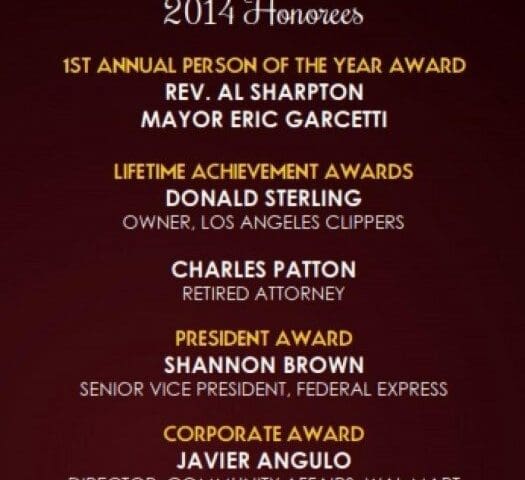
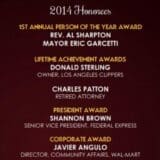
In an excruciating example of bad timing, the Los Angeles chapter of the NAACP was scheduled to bestow its Lifetime Achievement Award to Donald Sterling, owner of the Los Angeles Clippers basketball team, at its May 15 banquet. Sterling is now under fire for racist comments caught on a recording that surfaced on the TMZ website. Even President Barack Obama weighed in, condemning Sterling’s remarks as “incredibly offensive.” The NBA is now investigating Sterling’s remarks and could invoke sanctions, including removing him as Clippers’ owner.
Embarrassed by the controversy, the NAACP announced Sunday morning, via Twitter, that is was withdrawing the award, which was to be presented at the Millennium Biltmore Hotel in Los Angeles as part of the celebration of the chapter’s 100th anniversary. The NAACP also plans to honor Rev. Al Sharpton and Los Angeles Mayor Eric Garcetti — as well as Walmart’s local charity and political operative and a top Fed Ex executive —


A quarter of all working Americans have no savings, and half die with less than $10,000 in financial assets. Nevertheless, some of us will have a small nest egg, and where to put that bit of money can be a challenge. Even for many socially minded people what we know we’ve learned from “talking to Chuck.” But there are alternatives and they matter.
I first became aware of other ways to think about investments when I realized my denomination’s retirement fund screens its portfolio for tobacco, alcohol, gambling and guns. Many other faith communities with substantial funds do also. There are also a number of public mutual funds that have significant track records in screening for social responsibility issues. Some invest in alternative energy. Some avoid military contractors. Some look for environmentally enhancing product lines. Others invest in locally owned small businesses or in organic food sources. And some do a combination of all those.
» Read more about: Finance the Future By Investing in Change »


Nina Revoyr is the author of four acclaimed novels, including Southland, The Age of Dreaming and Wingshooters. She is also executive vice president of Children’s Institute in Los Angeles and has taught at Pitzer and Occidental colleges, and at Antioch and Cornell universities. Revoyr will be this year’s keynote speaker at the Los Angeles Alliance for a New Economy’s Women for a New Los Angeles Luncheon on May 9. We recently spoke to her about her work and Los Angeles’ place in it.
Your first novel, A Necessary Hunger, dealt with two young girls on the cusp of adulthood. What are the particular challenges young people of color face growing up in Los Angeles today?
I can’t speak to all young people of color,
» Read more about: Trauma and Vision: An Interview With Novelist Nina Revoyr »

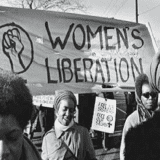
The civil rights movement of the 1960s is now iconic. Who would speak out against its aims? And the farm workers are finally getting their due as Cesar Chavez and the power of the organization he led are being recalled in film and literature. But who speaks up for the women’s liberation movement? In popular culture, its activists were usually portrayed as self-centered, bra-burning,* man-hating New Yorkers.
To create an historic record of what really happened in the women’s movement, and to rescue it from ridicule and misconceptions, Boston University recently organized a conference titled, “A Revolutionary Moment: Women’s Liberation in the Late 1960s and Early 1970s.” The gathering drew more than 600 people — about two-thirds women activists and academics of that certain age, and one-third younger women and men interested in getting the history right.
In the opening conference session feminist historian Sara Evans explained that the spark that lit women’s liberation came from the other movements of the 1960s,


For a long time now, we’ve been a nation of brands. We have our favorite candy bars, sodas, toothpastes and even TV channels. We watch, use and eat “our” brands and leave the others on the shelf. But few of us realize how many of those items we love are actually owned by the same conglomerate – huge financial institutions that consolidate into their systems one product after another.
And often, what we don’t know can hurt our communities. When a handful of companies own all of the most popular brands that Americans use every day, they hold a privileged monopoly on our lives. Capitalism is supposed to offer choice, but more and more the decision is between one huge marketing scheme and another. Capitalism is supposed to foster consumer democracy, but instead it channels our choices into a few mega-corporations that are enriched by our loyalties.
Take media.
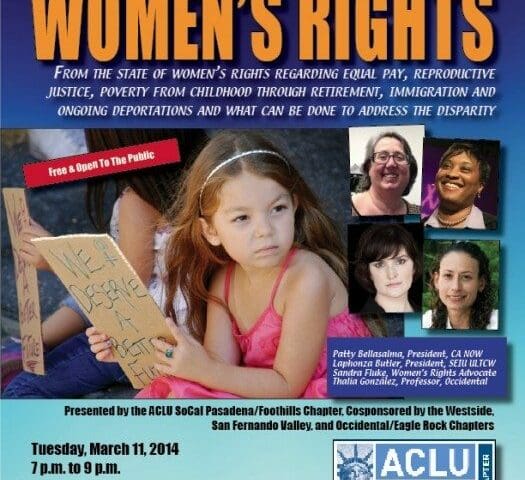

Tuesday’s bimonthly SoCal ACLU discussion forum will address the topic of women’s rights. Organized by the ACLU’s Pasadena/Foothills chapter, the event promises to be a much larger event than usual, prompting the chapter’s Sharon Kyle to announce its move to a bigger venue. Discussion topics will focus on women’s economic, political, social and legal rights, said Kyle, who publishes LA Progressive. Four guest speakers include the California president of the National Organization for Women, Patty Bellasalma; Service Employees International Union United Long Term Care Workers president Laphonza Butler; attorney and activist Sandra Fluke (who so angered Rush Limbaugh two years back), and Occidental College professor Thalia González.
Kyle, who says that she and other black women haven’t always felt connected to the women’s movement, thinks this particular topic is ready for revisiting. For Kyle, the intersection of race and gender is central to the Women’s Rights Forum.
» Read more about: Laphonza Butler, Sandra Fluke Speak at Women’s Forum »


The most difficult conversations for most activists happen with family. Particularly with parents or aunts and uncles, and cousins who disagree with a politically progressive perspective. My parents and I stopped talking about world events long before they died. I think that is a fairly normal behavior choice — just stop talking. When I visit with cousins who live in red states or the red parts of blue states, I almost always try to avoid any discussion that could lead to conflict. And I think they do too.
On the other hand, such difficult discussions are sometimes hard to avoid. Late last fall I received a screed forwarded by a cousin who lives in one of those red places on the map about an issue I thought had long gone the way of most such topical conflicts: the President’s birth certificate. I knew this was still a hot issue in some quarters during the President’s reelection,


Every January, our state celebrates the work and legacy of Dr. Martin Luther King Jr., a hero who sacrificed his life in the fight to end discrimination and poverty in America. In this respect, it seems appropriate that January is also the month when our Governor releases his budget proposal. The State Budget is more than numbers; it reflects our collective priorities and funds what is most important. Sadly, this budget proposal fails to honor Dr. King and his fight for justice. Within the Governor’s proposal are further cuts to critical social service programs. There is no clearer or more tragic example of this disinvestment than our state’s willingness to cut access to state-sponsored child care for low income families. In the name of justice and equality, we ask the Governor to fully fund child care to ensure universal access to all and quality work conditions for providers.
Currently we have more than 300,000 children languishing on waiting lists,


Lara Bergthold remembers the afternoon she and Norman Lear arrived at Pete Seeger’s rustic home overlooking the Hudson River, a house Seeger and his wife Toshi had built themselves years before. Bergthold, a prominent political and communications strategist and former executive director of the Lear Family Foundation, was the associate producer of Pete Seeger: The Power of Song, a 2007 documentary about the famed folksinger and social activist, and had recently brought Lear into the project. The two had been chauffeured from Manhattan in a Mercedes sedan and were eager to discuss ideas to improve the film that had so far been shot by director Jim Brown.
“When we pulled up to his house,” says Bergthold, “Norman and I get out of the back, and Pete walked around us and to the driver and shook his hand and invited him to come in for salad. He considered the driver to be the person he should greet first and it didn’t matter that the driver was a nameless person.
» Read more about: Pete Seeger Remembered: A Conversation With Lara Bergthold »
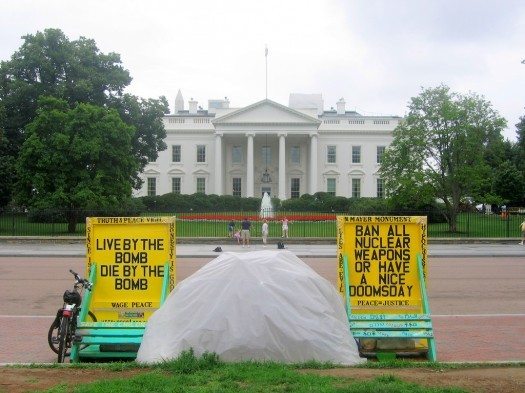

Last month two of L.A.’s richest men decided they needed to defend their wealth in a Los Angeles Times opinion piece. The headline read: “It Isn’t a Sin to Be Rich.”
Of course it isn’t. No one has said it was a sin to be rich in a very long time. After all, rich is a state of being. It’s greed that makes the list of cardinal sins.
Naturally, social critics and political figures have spoken about the shrinking middle class. They’ve talked about the social instability caused by the exponential growth of wealth and the relatively shrinking resources of the working poor. Even film makers have produced documentaries describing a few people’s wealth growing so exorbitantly that it virtually pauperizes the rest of us. So apparently the two rich guys felt the sting and decided they needed to defend their class.
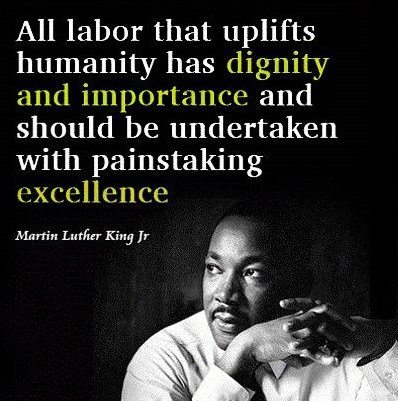
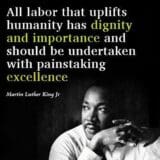
Last year, as we remembered the life and legacy of Reverend Dr. Martin Luther King, Jr., we focused much of our attention on the 50th anniversary of the March on Washington for Jobs and Freedom. We reflected on the historical words that followed, “I have a dream” and reaffirmed our commitment to keeping the dream alive.
We measured our progress through victories such as the end of Jim Crow segregation, the passage of the Civil Rights and Voting Rights Acts, and the election of our first African American President. We also talked about where we need to devote our efforts for the dream to become a reality.
With that, one year later we are reminded of the inequalities that still exist and the call to action we must all answer:
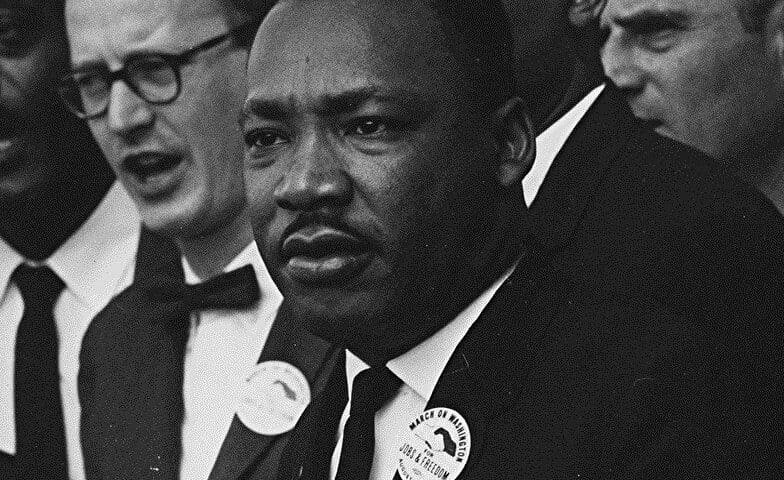
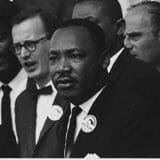
“I’m not in despair, because I know that there is a moral order. I haven’t lost faith, because the arc of the moral universe is long, but it bends toward justice.”


“Happy New Year!” is the salutation we use to greet each other around the turn of every year. We talk as if what is past has disappeared in the rear view mirror and that what’s ahead will be brand new, novel and something completely different. In newspapers, blogs, magazines and cartoons, we survey the events of the year past and make predictions about the year ahead.
In reality not much ends on December 31st except the calendar hanging in our kitchen. Instead, the issues of one year carry over into the next. The behaviors of one year become the practices of the next. In the real world, matters of conflict and tension continue over years, even over decades.
This is the baggage that we’ll continue to carry with us in the new year: